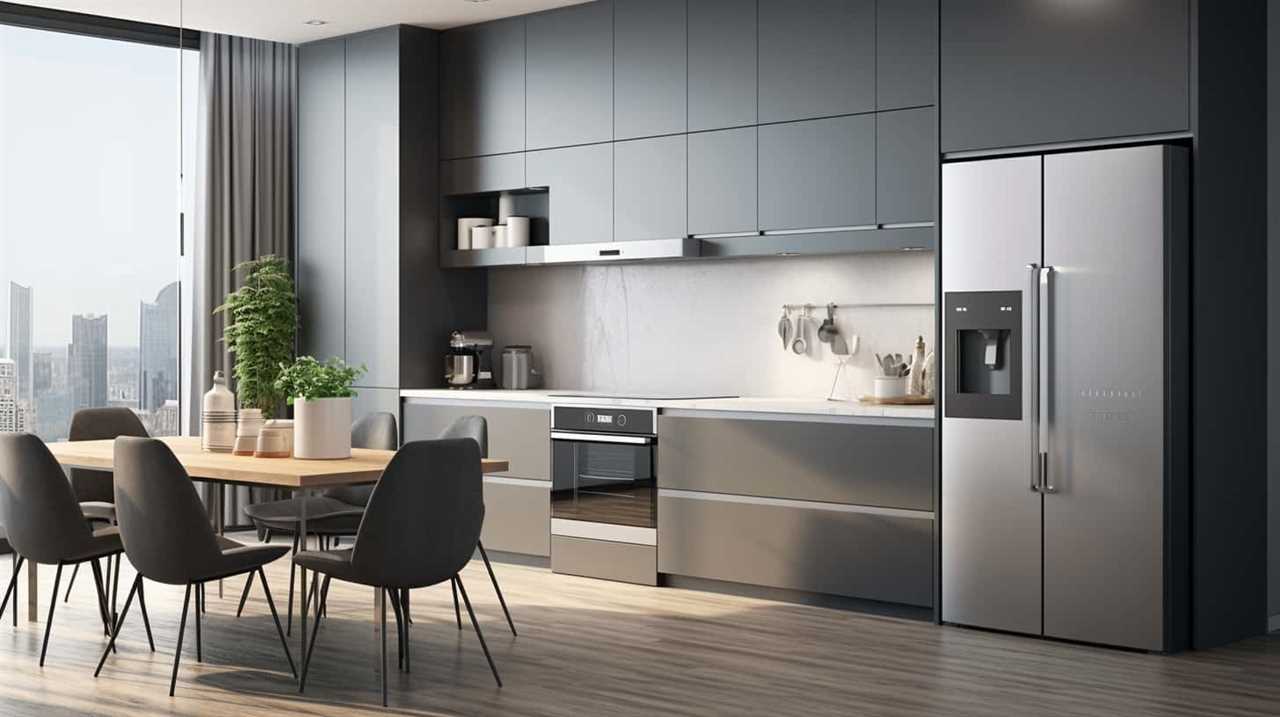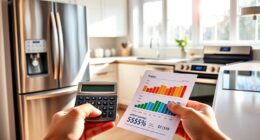In recent years, the idea of appliances operating on DC power has become increasingly popular, particularly with the growth of renewable energy sources and off-grid lifestyles. Although AC power has historically been the norm for homes and businesses, the possibility of appliances running on DC power has piqued curiosity and is being further explored.
In this article, we will delve into the world of DC power and explore the possibility of appliances running on this alternative form of energy. We will discuss the advantages and challenges of using DC power, examine the types of appliances that can operate on DC, and analyze the cost and environmental implications of this power source.
By the end, readers will have a comprehensive understanding of the viability of DC power for their appliances.
Key Takeaways
- DC power is more efficient and can potentially lead to lower energy consumption and electricity bills.
- Some appliances, like refrigerators, fans, lighting systems, laptops, and smartphones, can run directly on DC power.
- DC-compatible appliances offer increased compatibility with renewable energy sources like solar panels.
- Converting AC appliances to DC requires proper power supply selection, voltage regulation, and potential investments in adapters and converters.
What Is DC Power
DC power is a form of electrical energy that flows in a constant direction, typically generated by sources like batteries or solar panels. It differs from AC power, which alternates its direction periodically.

DC power has several advantages when used in homes. Firstly, it is more efficient than AC power as there is no energy loss due to the conversion process. Secondly, it is safer as there is no risk of electric shock from reversing currents. Additionally, DC power can be easily stored in batteries, providing backup power during outages.
However, there are also disadvantages to using DC power for appliances. Most household appliances are designed to run on AC power, so using DC power would require additional converters or adapters, which can be costly. Furthermore, the availability of DC power in homes is limited compared to the widespread availability of AC power.
Understanding AC Vs DC
The comparison between AC and DC power is crucial in understanding the potential for appliances to run on DC. Here are the key points to consider when comparing AC and DC power:
- Appliance compatibility: Most appliances are designed to run on AC power. However, with the advancement in technology, some appliances now come with built-in converters that allow them to run on DC power as well.
- Power consumption: DC power is generally more efficient than AC power when it comes to power consumption. Appliances that run on DC power can potentially save energy and reduce electricity bills.
- Conversion process: In order to run appliances on DC power, AC power needs to be converted to DC power using a power inverter. This conversion process can introduce some inefficiencies and additional costs.
Understanding the differences between AC and DC power is essential in determining the feasibility and compatibility of running appliances on DC power.

Appliances That Can Run on DC
When considering appliances that can run on DC, there are several options available. These include:
- DC-compatible appliances such as DC refrigerators, DC fans, and DC lighting systems.
The advantages of using DC appliances include:
- Increased energy efficiency
- Reduced power losses
- The ability to integrate with renewable energy sources.
Dc-Compatible Appliance Options
Exploring appliance compatibility with DC power involves identifying appliances that can operate on direct current. As the demand for energy-efficient and sustainable solutions grows, the DC compatible appliance market is expanding.
Here are three sub-lists of DC-compatible appliance options:

- Lighting: LED lights are a popular choice for DC power as they can operate efficiently without the need for an AC-to-DC converter. They provide high-quality illumination while consuming less energy compared to traditional incandescent bulbs.
- Electronics: Many electronic devices, such as laptops, smartphones, and tablets, can run on DC power directly. This eliminates the energy losses associated with converting AC to DC, making them more efficient.
- HVAC Systems: DC-powered heating, ventilation, and air conditioning (HVAC) systems offer significant energy savings. They can operate more efficiently without the need for inverters, resulting in lower electricity consumption and reduced carbon footprint.
Advantages of DC Appliances
One advantage of appliances that can run on DC power is that they eliminate the energy losses associated with converting AC to DC. In a traditional AC-powered home, most appliances are designed to run on alternating current (AC), which is what is supplied by the power grid. However, many of these appliances actually operate using DC power internally. This means that when AC power is supplied to the appliance, it needs to be converted to DC power, resulting in energy losses during the conversion process. By using appliances that can run directly on DC power, these energy losses can be eliminated, resulting in more efficient operation and potentially lower energy bills. The table below highlights some of the benefits of using DC appliances in homes compared to traditional AC appliances.
| Benefits of DC Appliances | Benefits of AC Appliances |
|---|---|
| Eliminate energy losses | Wider range of options |
| More efficient operation | Easily compatible with AC |
| Potential cost savings | Commonly available |
| Reduced environmental impact | Established technology |
| Increased system reliability |
Advantages of Using DC Power
There are numerous advantages to using DC power for running appliances.
- Efficiency: DC power is more efficient than AC power because it eliminates the need for conversion from DC to AC and vice versa. This means that less energy is lost during the conversion process, resulting in lower energy consumption and reduced costs.
- Compatibility with Renewable Energy: DC power is compatible with renewable energy sources such as solar panels and wind turbines. Since these sources generate DC power, using DC appliances eliminates the need for additional conversion, making the overall system more efficient.
- Reduced Potential Drawbacks: DC power has fewer potential drawbacks compared to AC power. It is safer to handle, as there is no risk of electric shock due to the absence of alternating current. Additionally, DC power systems are less prone to power surges and voltage fluctuations.
By utilizing DC power, appliances can leverage the advantages of using renewable energy more effectively, while minimizing potential drawbacks associated with AC power.
However, there are still challenges to consider when using DC power.

Challenges of Using DC Power
Using DC power for appliances presents several challenges.
One major challenge is voltage compatibility issues, as most appliances are designed to operate on AC power and may not function properly or efficiently on DC power.
Additionally, the limited availability of adapters for DC power can make it difficult to connect appliances to DC power sources.
These challenges highlight the need for careful consideration and potential modifications when attempting to run appliances on DC power.

Voltage Compatibility Issues
Voltage compatibility issues pose significant challenges when using DC power for appliances.
One of the main issues is the need for voltage conversion. Many household appliances are designed to run on AC power, which typically operates at a voltage of 120V or 240V. DC power, on the other hand, is typically supplied at lower voltages, such as 12V or 24V. This requires the use of voltage converters or regulators to match the voltage requirements of the appliances.
Another challenge is power consumption. Appliances designed for AC power may have different power consumption characteristics when operated on DC power. This can lead to inefficiencies and potential damage to the appliances if not properly managed.
Additionally, voltage compatibility issues can be compounded by the limited availability of adapters and converters specifically designed for DC power, making it more difficult to find suitable solutions for powering appliances with DC power sources.

Limited Availability of Adapters
The availability of adapters specifically designed for DC power sources is limited, posing challenges for using DC power to run appliances. Adapters play a crucial role in converting the DC power from a source such as a battery or solar panel to the appropriate voltage and current required by appliances.
However, the market for DC adapters is not as extensive as that for AC adapters, which are commonly used in households. This limited availability of DC adapters makes it difficult for consumers to find suitable options for their appliances.
Additionally, voltage regulation becomes a concern when using DC power, as appliances often require specific voltage levels for optimal performance. Furthermore, power consumption can vary between different appliances, and the lack of compatible DC adapters further complicates the efficient use of DC power.
Can I Convert AC Appliances to DC
It is possible to convert AC appliances to DC by utilizing a suitable power supply. This conversion process allows for the utilization of DC power advantages in AC appliances.

Here are three subtopics to consider when converting AC appliances to DC:
- Power Supply Selection: Selecting an appropriate power supply is crucial for converting AC appliances to DC. It should provide the required voltage and current capacity to match the appliance’s specifications.
- Rectification: The AC power from the main supply needs to be rectified into DC power through the use of rectifiers. These rectifiers convert the alternating current into a direct current suitable for the appliance.
- Voltage Regulation: DC power can have varying voltage levels, so it is essential to regulate the voltage to match the appliance’s requirements. This can be achieved using voltage regulators or DC-DC converters.
Is DC Power More Energy Efficient
When considering the energy efficiency of DC power, several points come into play.
First, DC power tends to be more efficient than AC power because it eliminates the need for power conversion, resulting in reduced energy losses.
Second, appliances that operate on DC power consume energy more efficiently as they can be designed to match the specific power requirements, reducing wastage.

Lastly, the use of DC power offers additional benefits such as improved power quality, reduced electromagnetic interference, and increased system reliability.
Efficiency of DC Power
DC power, being more energy efficient, offers significant advantages over AC power in terms of appliance operation. The efficiency of DC power refers to how effectively it can convert electrical energy into useful work without wastage.
Here are three key advantages of DC power efficiency:
- Lower energy losses: DC power has lower transmission and distribution losses compared to AC power. This is because DC power does not suffer from issues like skin effect and reactive power losses, which are common in AC power systems.
- Improved appliance performance: Since DC power is more efficient, it allows appliances to operate at their optimal performance levels. This means that appliances can deliver better performance while consuming less energy, resulting in cost savings and reduced environmental impact.
- Enhanced renewable energy integration: Many renewable energy sources, such as solar panels and wind turbines, generate DC power. By using DC power directly, without the need for conversion to AC, the efficiency of renewable energy systems can be maximized.
Appliance Energy Consumption
Appliance energy consumption can be more efficient with DC power, as it offers greater energy savings compared to AC power. When it comes to appliance energy efficiency, the type of power source used plays a significant role in determining the overall energy consumption and its impact on electricity bills.

To demonstrate the energy savings of DC power, let’s consider a comparison table:
| Appliance | Power Consumption (AC) | Power Consumption (DC) | Energy Savings |
|---|---|---|---|
| Refrigerator | 2000W | 1500W | 25% |
| Air Conditioner | 3000W | 2500W | 16.7% |
| Television | 150W | 100W | 33.3% |
As shown in the table, appliances running on DC power consume significantly less power, resulting in substantial energy savings. This translates to lower electricity bills and a reduced carbon footprint.
With the knowledge of the significant energy savings offered by DC power, we can now delve into the various benefits it provides.
Benefits of DC Power
One significant advantage of DC power is its superior energy efficiency compared to alternative power sources. DC power has several benefits that contribute to its efficiency and make it a desirable option for appliances.

- Reduced energy loss: DC power eliminates the need for power conversion, which reduces energy loss that occurs when converting AC power to DC power.
- Direct use of energy: DC appliances can directly utilize the energy provided by DC power sources without the need for additional conversions, resulting in improved efficiency.
- Elimination of vampire power: DC power eliminates vampire power, which refers to the energy consumed by appliances even when they are not in use. With DC power, appliances can be completely disconnected from the power source, ensuring no unnecessary energy consumption.
These benefits of DC power contribute to its superior energy efficiency, making it an attractive option for appliances and other electrical devices.
Safety Considerations for DC Appliances
When operating appliances on a DC power source, it is crucial to take into account the necessary safety precautions. Safety precautions for using DC appliances involve several key considerations to ensure the protection of both individuals and equipment.
One common hazard associated with DC power usage is the potential for electrical shock. DC power can still cause serious injury or even be lethal if not handled properly. Another hazard is the risk of fire. DC power can generate heat and sparks, which can ignite flammable materials.
To mitigate these risks, it is important to install proper grounding systems, use appropriate fuses or circuit breakers, and ensure proper insulation and wiring techniques. Regular maintenance and inspections are also essential to detect any potential hazards and prevent accidents.

How to Power Appliances With DC
To effectively power appliances with DC, it is essential to implement a reliable and efficient electrical system. This can be achieved by following these steps:
- Solar Energy: Consider powering appliances using solar energy, which generates DC power directly from sunlight. Solar panels convert sunlight into electricity, which can then be used to power DC appliances. This eliminates the need for an AC-DC conversion, making the system more efficient.
- Efficiency of DC Power: DC power is inherently more efficient than AC power, as there is no need for conversion between the two. By using DC power directly, energy losses due to conversion and transmission are minimized. This results in a more efficient and cost-effective system.
- Proper Wiring and Circuitry: Ensure that the electrical system is designed with proper wiring and circuitry to handle the DC power requirements of the appliances. This includes using appropriate wire gauges, fuses, and circuit breakers to ensure safety and optimal performance.
DC Power Options for Homes
DC power options for homes include various renewable energy sources and efficient electrical systems that can effectively power appliances without the need for an AC-DC conversion.
One option for DC power installation is solar panels, which convert sunlight directly into DC electricity. These panels can be installed on rooftops or in open areas to harness the abundant energy from the sun.
Another option is wind turbines, which generate DC power from the wind’s kinetic energy.

DC microgrids and battery storage systems can be used to store and distribute the generated DC power.
The benefits of using DC power in homes include increased energy efficiency, reduced energy loss during transmission, and the ability to integrate with other DC-powered devices such as electric vehicles.
Transitioning to DC power in homes can pave the way for a more sustainable and resilient energy future.
In the next section, we will compare the cost of AC and DC appliances.

Cost Comparison: AC Vs DC Appliances
The cost comparison between AC and DC appliances reveals significant differences in terms of energy efficiency and operational expenses. When considering the cost comparison between AC and DC appliances, it is important to take into account the energy consumption of each type. Here are three key points to consider:
- Energy Efficiency:
DC appliances are generally more energy efficient compared to AC appliances. This means that DC appliances require less energy to operate, resulting in lower energy consumption and reduced electricity bills. - Operational Expenses:
AC appliances often require additional components, such as transformers and inverters, to convert the electricity from DC to AC. These additional components can increase the operational expenses of AC appliances, making them more expensive to maintain compared to DC appliances. - Long-Term Savings:
Due to their higher energy efficiency and lower operational expenses, DC appliances can provide long-term cost savings. Although the initial purchase cost of DC appliances may be slightly higher, the savings in energy consumption and operational expenses can outweigh this initial investment over time.
Considering the cost comparison between AC and DC appliances, it is clear that DC appliances offer potential cost savings through their increased energy efficiency and lower operational expenses. This makes them an attractive option for those looking to reduce their overall energy costs.
This cost comparison also highlights the potential environmental benefits of using DC power, which will be discussed in the subsequent section.
Environmental Benefits of DC Power
The use of DC power in appliances offers significant environmental benefits.

One of the key advantages is increased energy efficiency compared to AC power.
DC power allows for more direct and efficient power transfer, reducing energy losses and ultimately lowering carbon emissions.
Energy Efficiency of DC
Energy efficiency is a key benefit of using direct current (DC) power for appliances. When comparing the energy consumption of DC power to alternating current (AC) power, DC power proves to be more efficient. Here are three reasons why:
- Lower energy losses: DC power has lower transmission and conversion losses compared to AC power. This means that more of the energy generated is effectively used, reducing wastage.
- Reduced heat generation: AC power produces more heat due to its oscillating nature, leading to increased energy loss. In contrast, DC power generates less heat, resulting in improved energy efficiency.
- Better voltage control: DC power allows for precise voltage control, which eliminates the need for additional energy-consuming devices like transformers.
Reduced Carbon Emissions
One key environmental benefit of DC power is its ability to reduce carbon emissions. DC power is typically generated from renewable energy sources such as solar panels and wind turbines, which produce electricity without the need for fossil fuels. By utilizing DC power and renewable energy sources, carbon emissions associated with traditional AC power generation can be significantly reduced.

In addition to the use of renewable energy sources, government regulations play a crucial role in promoting the adoption of DC power systems. Governments can incentivize the implementation of DC power by providing tax breaks or subsidies for renewable energy projects. Furthermore, regulations can encourage the use of DC power in residential and commercial buildings, ensuring that the benefits of reduced carbon emissions are realized across various sectors.
DC Power in Off-Grid Living
In the context of off-grid living, appliances can operate efficiently using DC power. DC power, which stands for direct current, is different from AC power (alternating current) commonly used in grid-connected homes. When it comes to off-grid living, where access to traditional power sources is limited or nonexistent, DC power offers several advantages over other alternatives like solar power.
Advantages of DC power in off-grid living include:
- Energy efficiency: DC power is more efficient as it eliminates the need for power conversion from AC to DC, reducing energy losses.
- Cost-effectiveness: DC appliances are generally less expensive and easier to maintain compared to their AC counterparts.
- Compatibility with renewable energy sources: DC power can be directly utilized with renewable energy sources like solar panels, eliminating the need for inverters.
Conclusion: Is DC Power a Viable Option?
After considering the advantages of DC power in off-grid living, it is evident that DC power is a viable option for running appliances.

DC power offers significant cost savings and enhanced power reliability compared to AC power. With DC power, there are fewer energy losses during transmission and distribution, resulting in reduced electricity costs.
Additionally, DC power systems are less prone to power outages caused by grid failures, making them more reliable for off-grid living. Moreover, DC power eliminates the need for inverters, which can be expensive and result in energy losses.
This further contributes to the cost-effectiveness of DC power. Overall, the combination of cost savings and improved power reliability makes DC power a practical and sustainable option for running appliances in off-grid settings.
Frequently Asked Questions
Can Appliances That Run on DC Power Be Used in Homes That Are Not Off-Grid?
DC appliances can be used in homes that are not off-grid, as they offer advantages such as compatibility with renewable energy sources. They can potentially reduce energy consumption and utility bills by converting energy more efficiently compared to AC appliances.

Are There Any Limitations to the Types of Appliances That Can Run on DC Power?
There are limitations to the types of appliances that can run on DC power, as not all appliances are compatible. However, using DC appliances in homes offers benefits such as improved energy efficiency and reduced reliance on the grid.
How Does the Cost of DC Appliances Compare to AC Appliances?
In comparing the cost of DC appliances to AC appliances, a comprehensive efficiency analysis is required. Factors such as initial purchase cost, energy consumption, and maintenance expenses must be considered to determine the overall cost-effectiveness of DC appliances.
What Are the Safety Considerations When Using DC Appliances?
When considering the safety considerations of using DC appliances versus AC appliances, it is important to assess the potential risks associated with electrical shock, fire hazards, grounding, and overload protection.
Is It Possible to Convert Existing AC Appliances to Run on DC Power?
Converting existing appliances to run on DC power offers several benefits, including increased energy efficiency and reduced electricity consumption. However, it requires technical expertise and may not be feasible for all appliances due to compatibility issues.

Conclusion
In conclusion, DC power offers numerous advantages such as energy efficiency, reduced transmission losses, and compatibility with renewable energy sources.
However, its adoption in mainstream appliances is limited due to challenges like limited availability of DC appliances and higher upfront costs.
While DC power holds promise for off-grid living, its widespread use in everyday appliances remains a distant reality.
As we navigate towards a more sustainable future, exploring and overcoming these challenges will be crucial in making DC power a viable option for all.









